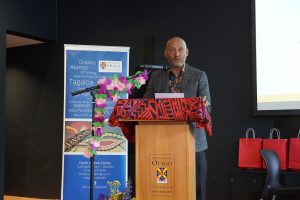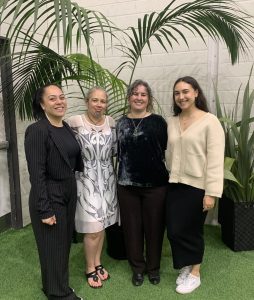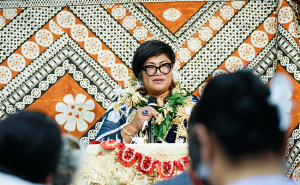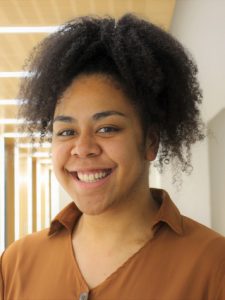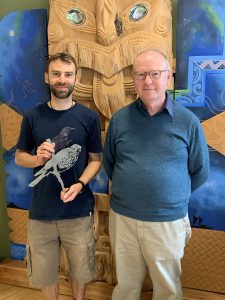PacTNet panel discussion & Pacific Voices Alumni celebration
On 27 November 2023, 20 years of the University of Otago’s Pacific Voices Postgraduate Symposium was celebrated with alumni, staff and current Pacific students at the Auahi Ora space in the Student Union Building. The evening programme began with an address from Tofilau Nina Kirifi-Alai, past manager of the Pacific Islands Centre and current Pacific Community Engagement Manager in Auckland. Tofilau shared reflections on establishing the symposium after seeing the need for postgraduate support in 2002 and gave encouraging words for organisers and students taking the symposium forward.
Her opening remarks were followed by an address from Deputy Vice Chancellor, Research & Enterprise, Professor Richard Blaikie who commented on Pacific research within the context of the University’s strategic direction. He enthusiastically supported Tofilau’s opening remarks and later engaged openly with the audience during the Q&A session at the end of the evening.
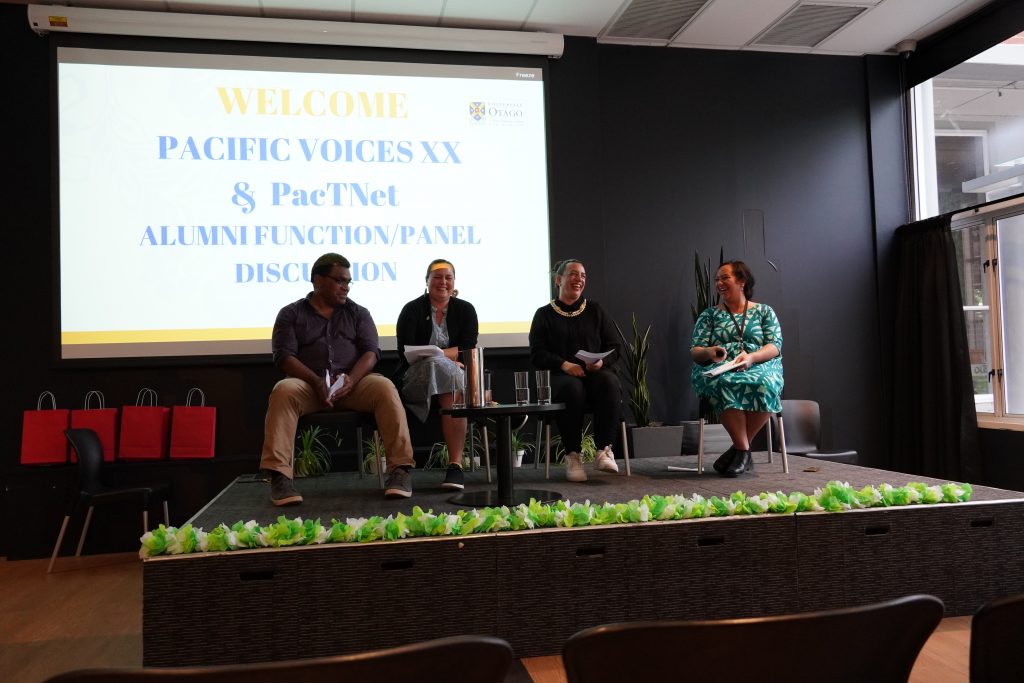
Panelists L-R Dr Tui Rakuita (Sociology), Dr Jess Pasisi (Te Tumu), Professor Rose Richards (Acting Director, Pacific Development Office & Co-Director of Coastal People, Southern Skies) and facilitator Dr Emma Powell (Te Tumu).
As a part of the programme, the symposium organisers and staff from the Pacific Development Office teamed up with the Pacific Thought Network (PacTNet) to arrange a public panel discussion. Earlier this year in May, PacTNet held its inaugural Pacific Lecture which was given by Tootooleaava Dr Fanaafi Aiono Le-Tagaloa and the panel gathered key Pacific thinkers from our university community to reflect on the ideas and comments made in the lecture. The panellists were Professor Rose Richards (Acting Director, Pacific Development Office & Co-Director of Coastal People, Southern Skies), Dr Tui Rakuita from Sociology and our very own, Dr Jess Pasisi. All of the panellists gave stimulating thoughts on Tootooleaava’s lecture, ranging from comment on Pacific leadership at the University of Otago, the significance of the diaspora to Pacific thinking, and the romanticism with which we hold Indigenous knowledge.
The PacTNet steering committee is made up of a number of our Te Tumu staff: Professor Patrick Vakaoti, Dr Telesia Kalavite and Dr Emma Powell. They are also joined by Dr Allamanda Fa‘atoese who is based in Christchurch and Dr Charles Radclyffe from Archaeology.
A number of our Te Tumu students participated and presented on their research during the Pacific Voices Symposium XX which was held on the following day, Tuesday 28 November 2023. For photos and coverage, check out the story from Pacific Communications Advisor, Keilah Vaetoru Fox, here.
MAI hui-ā-tau hosted by Te Kunenga ki Pūrehuroa, Massey University in Palmerston North
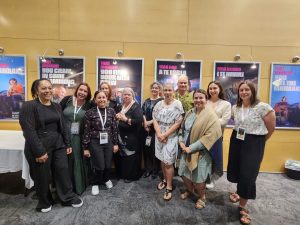
MAI ki Otago contingent at MAI hui ā-tau ki Te Kunenga ki Pūrehuroa, Massey University in Pamerston North.
Tokowhā ngā tauira Tohu Kairangi o Te Tumu e haere ana. Te rawe hoki o ngā kōrero me te whakawhanaungatanga i puta ai i reira. Kei runga noa atu te manaakitanga o ngā kaiwhakahaere nō reira, ngā mihi maioha ki a rātou. E rere hoki ana ngā mihi ki Te Kura Rangahau Tāura, ki a Rachel Sizemore kōrua ko Inano Walter i ā kōrua manaaki i a mātou, ko MAI ki Otago.
This year the annual MAI conference was hosted by Te Kunenga ki Pūrehuroa, Massey University in at the Palmerston North campus. Four PhD students from Te Tumu attended the hui. The presentations and networking opportunities were awesome. The hospitality of our hosts was amazing which we all appreciated. We also thank The Graduate Research School especially Rachel Sizemore and Inano Walter for supporting and looking after the MAI ki Otago group.
To Hell With Drowning: A Reflection
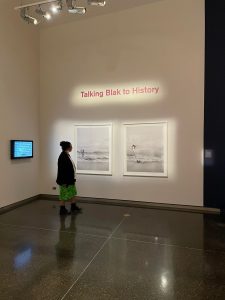
Māori scholar photographs Cook Islands scholar examining Aboriginal artwork confronting White Australian histories at the Australian National Museum, Canberra, April 2023. [click to enlarge]
This is the final reflection from our PhD students who attended the recent Australia Association for Pacific Studies conference in Canberra, by Stacey Kokaua-Balfour.
As someone who has only recently started their PhD, the recent AAPS conference was my first time attending an academic conference. I have come away with not only new questions but the awareness of new geographic and intellectual contexts that might shape those questions. What resonated most with me as someone who has operated in Pacific spaces in Aotearoa for some time, was the way our nation state and its distinct geo-political interests can shape not only how Pacific region and their peoples are framed but also what are considered the most important priorities for academic research.
AAPS was an opportunity to engage with Indigenous thinkers across cultures, nation state borders, languages, breaking across specific colonial interests in the Pacific. The Welcome to Country led by Aunty Serena Williams (Ngunnawal – Wiradjuri) best articulated the idea that as researchers, our best ideas spring from coming together and sharing the distinct and nuanced ways Indigenous peoples engage with land and each other.
Rethinking Australian Coloniality through Pacific Biography
Wanda Ieremia-Allan provides the second of the reflections from our PhD students who attended the recent AAPS conference in Canberra.
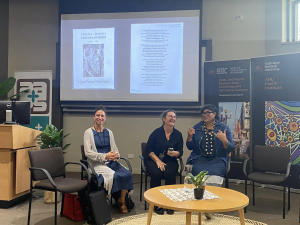
Wanda (right) alongside fellow panel presenters Hineitimoana Greensill and Pauline Reynolds [click to enlarge]
Fleets abound with Pacific scholars, creatives, activists and politicians met at the April 2023 ‘To Hell With Drowning’ Pacific Studies conference at the Australian National University (ANU) in Canberra. As a child of Sapapali’i, Sāoluafata, Safotulafai, Lalomanu, Vaie’e, Matāutu Falealili in Samoa, I extend my Fa’afetai to people of the unceded Ngunnawal and Ngambri lands (Canberra Australia) for their warm welcome and hospitality to country. Thank you also to the Australian Association for Pacific Studies (AAPS) organising committee led by Professor Katerina Teaiwa and Talei Mangioni for their care. Fa’afetai to the AAPS for the Guy Powles travel prize that made it possible for me to attend and I am grateful to my supervisors Dr. Jess Pasisi (Otago), Professor Alice Te Punga Somerville (UBC) and Tootooleaava Dr. Fanaafi Aiono Le-Tagaloa (USP Samoa) for their unwavering support and guidance. Thank you especially to Dr Jess Pasisi for the academic manaakitanga extended to many PhD students.
On a panel with Dr Pauline Reynolds of the Norfolk Island Museum and PhD student Hineitimoana Greensill, I presented my paper on Indigenous Pacific language archives and its role in ‘Rethinking Australian Coloniality through Pacific Biography’. Utilising the intersections between Professor Epeli Hau’ofa’s notion of the ‘totality of relationships’[1] and Māori scholar Professor Alice Te Punga Somerville’s poem ‘Room’[2] provided an opportunity to think about: ancestral links; ideological connections; and spaces of reckoning and recovery.
My paper focussed on Samoan historiography and the kinds of work that are made possible when we centre on Samoan language archives as sites of Indigenous knowledge production and historical recovery. This resulted in the emergence of an intellectual, geographical, linguistic and cultural Pacific expansiveness alongside the rich long standing embodied stories of Pacific connectivity that not only interrogate pervasive Australia white settler colonial histories but demand more institutional university spaces to conduct decolonial work with our languages. Samoan language archives recovered links with fellow kin, in particular South Sea Islanders of Mer Island, Torres Strait Island region where Samoan missionaries and local Mer Island people established the London Missionary Society church named ‘O le Sulu Samoa’ in 1902. Letters from Badu Islands and Vanuatu recovered family histories and brought to light the many ways in which Pacific Islanders see each other and connect over oceans of memory.
Advocating for the use of our own epistemological paradigms in archival engagement is necessary because as matua Tuaopepe Albert Wendt asserts ‘Oceania deserves more than an attempt at mundane fact; only the imagination in free flight can hope, if not to contain her, to grasp some of her shape, plumage and pain’[3]. This is the wero (challenge) set for us all.
[1] Hau’Ofa, E. (1994). Our sea of islands. The Contemporary Pacific, 148-161.
[2] https://nzpoetryshelf.com/2021/05/24/poetry-shelf-noticeboard-alice-te-punga-somervilles-room/
[3] Wendt, Albert, 1982. Towards a New Oceania. In: G. Amirthanayagam. (eds) Writers in East-West Encounter: New Cultural Bearings. London: Palgrave Macmillan, pp 202-215.
Reflections on ‘To Hell With Drowning’ AAPS Conference 2023
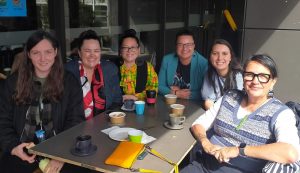
With fellow Māori scholars (L-R): Sam Iti Prendergast, Alice Te Punga Somerville, Marama Salsano, Innez Haua, Karamea, Jo Maarama Kāmira
The following is a reflective piece from Karamea Moana Wright, one of Te Tumu’s PhD candidates in Pacific Islands Studies.
The first Australia Association for Pacific Studies’ conference I participated in was held primarily online in 2021, with separate hubs in Aotearoa and Australia. Because we were in groups on our own campuses, I don’t think I fully understood the magnitude or value of the conference and the association itself until this month, when I attended for the first time in person.
The four days in Canberra at the Australian National University were packed with phenomenal panels, plenaries, roundtables, and whakawhanaungatanga with incredible Pacific thinkers, researchers, artists, leaders, and poets influential in our region and discipline.
This conference opened my eyes in greater measure to salient contemporary conversations taking place in the field, how my own research sits within the broader landscape of Māori, Pacific, and Indigenous Studies, and to see what is possible in my work moving forward. The AAPS conference has left me hopeful, motivated, refreshed, rejuvenated, and encouraged, underscoring the necessity to return for the next AAPS conference in 2023, held in Sydney.
Wonderful achievement for Te Tumu PhD candidate
Te Tumu PhD candidate Wanda Ieremia-Allan is now bound to the UK on a University of Cambridge fellowship to research the historical legacy of the Samoan periodical, O Le Sulu Samoa, a newspaper that has been active for 184 years.Otago’s Bulletin Board wrote a great article on Wanda’s achievement and the background of her interest in this newspaper. Click here to read more.
Success for Te Tumu Postgrad
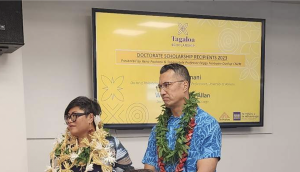 On Wednesday evening, 22nd February, one of our fabulous doctoral candidates, Wanda Ieremia-Allan, was awarded the Tagaloa Scholarship prize. In its second year of running, the Tagaloa Scholarship is awarded to four Pacific masters and doctoral students who are able to “demonstrate that their studies aim improve the social, economic and wellbeing of [the] Pacific, through a Pacific holistic worldview”. Wanda, who recently transferred to Te Tumu from Waikato, is in her final year of doctoral research in Pacific Studies. She is completing cutting-edge research on the impact of Sāmoan missionary newspaper O Le Sulu Samoa and its far-reaching impacts throughout the Pacific. Wanda is being supervised by University of British Columbia Professor Alice Te Punga Somerville, Otago alumni and current Director of USP’s Samoa Campus, To’oto’oleaava Dr. Fanaafi Aiono-Le Tagaloa, and Dr Jess Pasisi here in Te Tumu.
On Wednesday evening, 22nd February, one of our fabulous doctoral candidates, Wanda Ieremia-Allan, was awarded the Tagaloa Scholarship prize. In its second year of running, the Tagaloa Scholarship is awarded to four Pacific masters and doctoral students who are able to “demonstrate that their studies aim improve the social, economic and wellbeing of [the] Pacific, through a Pacific holistic worldview”. Wanda, who recently transferred to Te Tumu from Waikato, is in her final year of doctoral research in Pacific Studies. She is completing cutting-edge research on the impact of Sāmoan missionary newspaper O Le Sulu Samoa and its far-reaching impacts throughout the Pacific. Wanda is being supervised by University of British Columbia Professor Alice Te Punga Somerville, Otago alumni and current Director of USP’s Samoa Campus, To’oto’oleaava Dr. Fanaafi Aiono-Le Tagaloa, and Dr Jess Pasisi here in Te Tumu.
COVID-19 Talanoa: the South Canterbury Tongan community
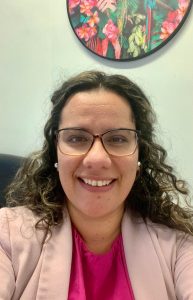 Last week, Pauline-Jean Luyten (Tongan, Dutch) walked across the graduation stage to be “capped” for completing her Master of Indigenous Studies degree.
Last week, Pauline-Jean Luyten (Tongan, Dutch) walked across the graduation stage to be “capped” for completing her Master of Indigenous Studies degree.
Pauline is a Timaru-based lawyer. She conducted her MIndS research on a local topic, but one that touches everyone across the globe: “COVID-19 Talanoa: The Voices of Tongan Kāinga in South Canterbury”. Dr Telesia Kalavite, of our Pacific Islands Studies programme supervised this research.
Abstract: This research is an exploratory study on the experiences of Tongan kāinga (distant relations/community) in the rural region of South Canterbury, New Zealand before and during the COVID-19 pandemic. It examines Tongan kāinga’s migration stories and their experiences in response to COVID-19 from March 2020 to May 2020. Migration stories were gathered to provide background and context for Tongan kāinga’s diverse responses during COVID-19 and to acknowledge participants’ journey to the diaspora. A further aim was to challenge the deficit theory paradigm often ascribed to Pacific ethnic-specific populations by demonstrating the richness and strength of Tongan cultural values, knowledge, and customs. The Kakala methodology comprised individual talanoa with nine participants based in South Canterbury. Findings showed that kāinga Tonga in South Canterbury derived strength from their children, family, and faith to persevere and support each other throughout the COVID-19 pandemic. Hardships were navigated through care and concern for others, gathering and processing information, and collective activation and mobility.
Findings also revealed that participants negotiated between Tongan and Western values in the predominantly New Zealand European ethnic region. They do this as individuals, and as kāinga through the Tongan Society South Canterbury. Local community-based solutions and cross-cultural provider collaboration, irrespective of ethnicity, was strong and effective in South Canterbury with selective organisations. Participants reflected and demonstrated that Tākanga ‘Emau Fohe (together we can make a difference) contributed to overcoming hardships during COVID-19. This is the first piece of academic research on the experiences of Tongan kāinga in South Canterbury, or any comparatively small Tongan or Pacific ethnic-specific community in New Zealand. Further research is warranted.
Future plans: We asked Pauline what her future plans might be. She replied, “I intend to undertake PhD study and conduct further research on Tongan kāinga in the provincial regions in the South Island or isolated areas in Aotearoa New Zealand. Being NZ born with both Tongan and Dutch heritage, I have an interest in exploring the praxis of engagement between cultures, identity and belonging. Most importantly, to identify practical ways for our respective cultures to understand each other, substantiated in community-based solutions and research. I aim to utilise the knowledge and skills derived from my thesis to assist with cultural awareness and education described in a way that is understood by mainstream resident population whilst ensuring maintenance of Tongan values. Contemporaneously, I endeavour to be and support our kāinga to be at the decision-making table to ensure equity of input, equity of access and equity of outcome and challenge the deficit theory paradigm. This way we can carry our ancestors’ values and leave a legacy for our fānau (children)”
Fakamālō atu, Pauline. We wish you all the best with your future studies.
MIndS students’ success
It’s graduation this coming Saturday (21 Aug), and Te Tumu is lucky to have three Master of Indigenous Studies students who are graduating. This is always a wonderful occasion for graduates themselves, as well as their families and their supervisors.
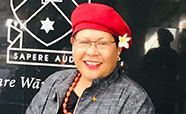 Tofilau Nina Kirifi-Alai (Sāmoa) was until recently the Manager of the University of Otago’s Pacific Islands Centre. She is currently the Inaugural Manager of Pacific Community Engagement, University of Otago, based in Auckland. This is a new role that the University of Otago established this year.
Tofilau Nina Kirifi-Alai (Sāmoa) was until recently the Manager of the University of Otago’s Pacific Islands Centre. She is currently the Inaugural Manager of Pacific Community Engagement, University of Otago, based in Auckland. This is a new role that the University of Otago established this year.
Research Title: “The Development of the Pacific Islands Centre at the University of Otago, Dunedin, New Zealand: A Personal Reflection”.
Supervisor: Telesia Kalavite
Abstract: “The purpose of a Centre for Pacific students is to seek and find ways whereby meanings, nuances and metaphors in Pacific cultures can speak to the heart, the soul and the mind of the students. The challenge here, as in other places, lies in how to articulate speech and writing to get meanings, nuances and metaphors of Pacific cultures within a monocultural academic environment” (Comment by His Highness Tui Atua Tupua Tamasese Ta‘isi Efi‘s inauguration speech at the formal opening of the Pacific Islands Centre, University of Otago, in 2003).
The establishment of the Pacific Islands Centre (PIC) in 2001 was a response by the University of Otago (UO) to the Tertiary Education Commission (TEC) initiatives to ensure the success of its Pacific students. Pacific Islands people’s participation in New Zealand society, including education, is still lagging behind that of the general population since the late 1960s. The PIC was the first-ever centre within New Zealand Tertiary Education Organisations (TEOs) and this year, 2021, marks its 20th anniversary. The PIC creates pathways for students’ success at the UO reflecting the government’s continuous attempt to improve the success rate of Pacific peoples in the education system. The PIC strongly becomes the impetus to lead and implement support for Pacific students and staff through its engagement with the UO and Pacific communities locally, nationally, regionally and internationally.
This research takes an autoethnographic Pacific approach. Autoethnographic because it documents my reflections as the inaugural Manager of the PIC since 2002; Pacific because it is a Pacific-focused centre, operated by Pacific staff for Pacific students and, most importantly, I, the researcher am Samoan, and of Pacific decent. My voice becomes central in documenting the Centre’s developmental history because when I first started as the pioneer of the PIC there was no specific Pacific model to build on, or strategic framework or manual to guide it. This research therefore, is basically grounded on Pacific philosophies of attitudes, views, ideas, values, beliefs, customs, traditions, practices and experiences of the researcher.
The PIC is significant for the educational development of Pacific students and staff at the UO. This research documents the journey of the PIC in terms of its history, developmental strategic plans, practices and reviews that enhance the success of everyone involved. This research is unique and authentic in its approach as it provides first-hand information on how the PIC nurtures Pacific Islands students in their academic journeys. It also adds value to the development of educational strategic directions of the UO to benefit both Pacific and non-Pacific communities at Otago, New Zealand, the Pacific region, and the world.
The first generation consists of the maternal and paternal grandparents of the author, in which they discuss vasu in its political definition of ‘half-caste’ or of mixed ethnic heritage. This generation will also elaborate on contributing themes to vasu, such as their relationships with their kinship groups, languages/dialects and their Fijian identity. As this generation is the only group to have regular visits and contact with their rural villages, vasu will be viewed through this lens.
The next generation is of the author’s parents and they will also discuss themes such as their own Fijian identity, as well as the role of Fijian women, domestic workers and accessibility to the village. This particular generation is part of the urban migration and will reflect over vasu with this viewpoint.
Finally, the last generation is of the author’s and her maternal and paternal first-cousins. The supporting themes for this generation’s understanding of vasu are customary Fijian relationships and concepts, mixed ethnicity and the use of Fijian language and knowledge. This generation is a part of the Fijian diaspora in New Zealand and will be using this perspective in sharing their understandings and experiences of vasu. Eventually, similar elements and concepts will be highlighted, with each generation sharing their own narratives on what vasu is to them. Despite the different time periods and physical contexts, the prominence of the maternal lineage has proven to play a significant role in every generation of this family, particularly in a patriarchal society that is known to Fiji.
 Nicola (Nicky) Andrews (Ngāti Pāoa) Nicky is currently a faculty librarian at the University of San Francisco where she teaches undergraduates how to do research; and work on other projects including research into Indigenous information literacy. She is open to pursuing a PhD in the future.
Nicola (Nicky) Andrews (Ngāti Pāoa) Nicky is currently a faculty librarian at the University of San Francisco where she teaches undergraduates how to do research; and work on other projects including research into Indigenous information literacy. She is open to pursuing a PhD in the future.
Nicky was initially supervised by the late Alumita Durutalo. Paerau Warbrick took over during the research design and interview phase, and Erica Newman supervised her work during the bulk of the writing and revising phase. Nicky is thankful to all three for their work and care. She will graduate in absentia.
Research title: “Historical Trauma, Indigenous People, and Libraries.”
Abstract: Historical trauma theory (HTT) built on understanding of Holocaust survivors and subsequent generations (Pihama et. al., 2014) and articulated how colonization and genocide against Indigenous peoples also resulted in historical trauma and intergenerational grief (Brave Heart & DeBruyn, 1998; Methot, 2019). In this research report, I examine how modern libraries reinforce historical trauma for Indigenous library users and workers through library origins, professional credentialing, staffing demographics, and policies. While historical trauma theory is rooted in social work (Brave Heart & DeBruyn, 1998), it is applicable to librarianship as a profession of public service that impacts Indigenous access to knowledge and self-discovery.
I conducted my research using kaupapa Māori and autoethnography frameworks, to interview five Indigenous librarians from Aotearoa, Canada, and the United States. Over Zoom, participants detailed their unique experiences as Indigenous people using libraries, studying library science, and working in libraries.
Participants spoke candidly about the racism and microaggressions they routinely encounter; and the isolating nature of often being the only Indigenous worker in their team or place of employment. In particular, participants recounted how historical trauma resurfaced when facing inadequate resources to support Indigenous knowledge, or when organizations reinforced policies that conflicted with Indigenous practices and worldviews.
However, participants also described hope and progress towards equity, aligning with contemporary shifts toward valuing Indigenous peoples in libraries. I make and acknowledge several recommendations in this report ranging from practical changes to library policies and practices, to frameworks to address historical trauma within library spaces. These practices can be applied beyond libraries into higher education, government work, and other sectors.
This Reseach can be accessed through OUR Archive.
Te Tumu would also like to congratulate Pipi Royal who will be graduating with their BA in Māori Studies.
PhD Celebration
When possible, Te Tumu always likes to acknowledge our students’ completions of their PhDs with a morning or afternoon tea. Today was our opportunity to celebrate Raphael Richter-Gravier, who graduated last December. Given that his thesis investigated Polynesian bird narratives, it was fitting that Te Tumu gifted Raphael with a 2-dimensional metallic sculpture of a kārearea (NZ falcon). His supervisor, Professor Michael Reilly, spoke about what a wonderful doctoral student Raphael was, one whose writing was stimulating and thoughtful, and didn’t need too much revising. Raphael also noted that his friend, Manu Berry has created a number of woodcuts inspired by the bird narratives, which are currently on exhibition at PC Gallery in Port Chalmers. Raphael has been with Te Tumu for a number of years, as a student and tutor in Māori Studies. He seems to have a lot of activities on his plate at present (including teaching French), and we wish him well for the future.

